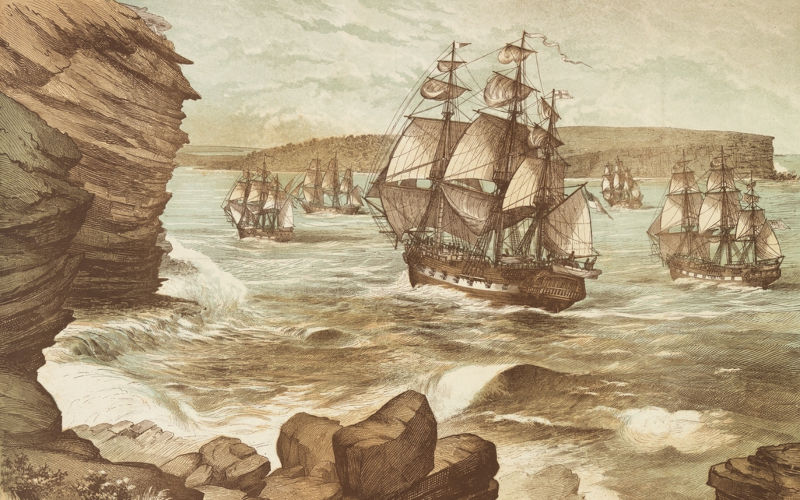Truth telling and lamentation before celebration
January 25, 2023
When one group of people takes the land of another by military force, invasion is the most accurate term. We would hardly speak of Germany settling France in 1940.
When Lieutenant James Cook sailed for the South Pacific to observe the transit of Venus for the Royal Society, he received further instructions marked secret from the Admiralty, You will also observe with accuracy the Situation of such Islands as you may discover in the Course of your Voyage that have not hitherto been discoverd by any Europeans and take Possession for His Majestydoing so with the Consent of the Natives to take possession of Convenient Situations in the Country in the Name of the King of Great Britain."
Under the then international law, England would be able to take possession of land in one of three ways; take it if vacant, have it ceded to them by the Indigenous people, or by military conquest.
After sailing right up the east coast of the Great Southland Cook took possession of it at Possession Island, north Queensland 22ndAugust 1770. Cook and the crew had made many forays up stream and to the varying hinterlands as they moved north meeting many of the differing Indigenous people, but permission as per the instructions to take possession was never sought from any of them. Cook, disregarding the Admiralty instructions, and his interactions with Aboriginal people took possession of the land under the fiction of it being terra nullius (empty land).
Nearly 18 years later Governor Phillip returned to turn make that possession a reality. His task was to find a place suitable for settlement for convicts from Englands overwhelmed prison system. Rejecting Cooks Botany Bay he chose Port Jackson. So began the British invasion of this land, for invasion is what it was. When one group of people takes the land of another by military force invasion is the most accurate term. We would hardly speak of Germany settling France in 1940.
Of course, most of those on that First Fleet had no desire to be part of the new colony and were to suffer under an often very brutal convict scheme. Death and anguish were primarily however to fall upon the Indigenous people in progressive waves, as the original invaders moved ever outward from Sydney.
The destruction of Indigenous societies was sometimes unintentional through the spread of diseases to which Aboriginal people had no resistance, though there were occasions when such diseases were deliberately spread. Mostly however, the killings were very intentional. Peoples were cleared in what euphemistically was called the drive and such massacres took place right up until the 1928 when in what is known as the Coniston massacre over 30 Aboriginal people were summarily killed by police action in the Northern Territory.
Policy until the 1960s in Australia was defined by what was called assimilation, the idea of assimilating the Aboriginal people into the White mainstream, white being the mainstream as all other races had been barred from coming to Australia by the very first Act passed by the Commonwealth in 1901.
The official policy was to eliminate the Aboriginal peoples. Such policy is now defined by international law as genocide.
Until 1966 Aboriginal people, being uncounted in the census, were not technically present in Australia. The land after all had been taken under the fiction that they did not exist.
The first title for land was not returned to Aboriginal people until 1975 with the then Prime Minister Gough Whitlam pouring sand into the hands of Vincent Lingiari, who had led the Wave Hill strike and walk off by the Gurindji people. Legal right to land under law would not be recognised until 1992 when the High Court did away with the fiction of terra nullius.
An apology for the dispossession and attempted genocide didnt come until delivered by Kevin Rudd in 2008.
In this dispossession of Aboriginal people, those who ought to have been guardians of ethics, the churches, were complicit. There were courageous exceptions. Two, which come to mind, locally to me are, Rev Lancelot Threlkeld during the early 19thcentury in the Lake Macquarie area, and Rev. Dr. J.S. White in Singleton in the second half of the 19thcentury. The few exceptions however demonstrate the overwhelming complicity.
I could express facile hopes for the way ahead, paths to reconciliation and harmonious co-existence, but I believe such are often used to whitewash the past. We cannot really move on until we address that past. We have yet to do that.
We need to be highly cognisant of the past and its brutality, reflecting upon it, feeling it at a profound level. Used of Jesus grief is a word translated into the Greek of the Gospels as splanchitzemai,literally meaning rent to the gut. This is the type of grief we need feel before we can move forward.
Only after dwelling longer in truth telling and feeling deeply lamentation will we be ready to move forward to celebration.

